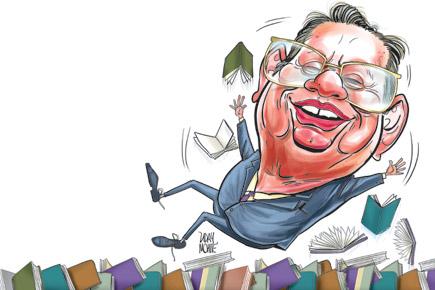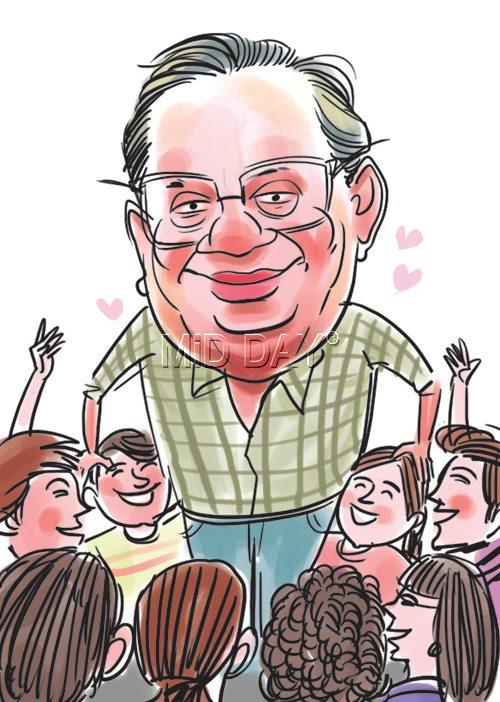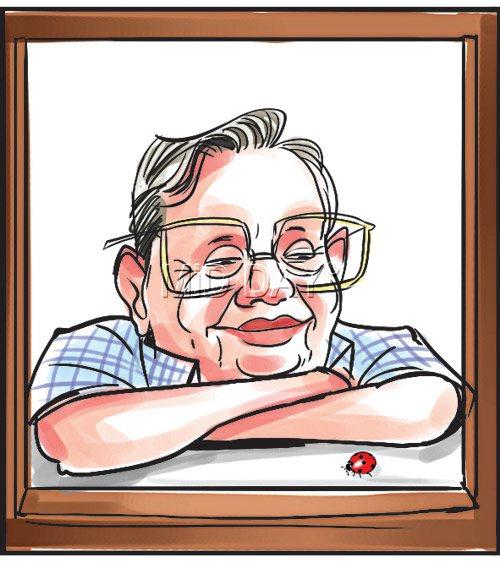When Ruskin Bond, the 82-year-old writer who has entertained generations of children, curates a collection on happiness, we ask, did he find it after all?

 We made a trunk call to India’s beloved children’s author, Ruskin Bond, who at 82, is far from calling it a day. It is morning in Landour, Mussoorie, where Bond stays with his family, and we politely eavesdrop into some commotion in the background. We don’t mean to pry of course, and, without us asking, Bond says that the children are stepping out into the municipal garden and that he should lock the door behind them. “When tourists come knocking, I sometimes pretend I am not at home,” says the author, who is otherwise known to amiably sign books at the local bookstores in his neighbourhood and nearby Dehradun. And then, as we continue talking, a tap is heard on the door. “Wonder who that could be — a tourist, or a ghost perhaps?” he says, drawing a little chuckle from us, as we are instantly propelled into the worlds that Bond created in his literary career of more than 60 years.
We made a trunk call to India’s beloved children’s author, Ruskin Bond, who at 82, is far from calling it a day. It is morning in Landour, Mussoorie, where Bond stays with his family, and we politely eavesdrop into some commotion in the background. We don’t mean to pry of course, and, without us asking, Bond says that the children are stepping out into the municipal garden and that he should lock the door behind them. “When tourists come knocking, I sometimes pretend I am not at home,” says the author, who is otherwise known to amiably sign books at the local bookstores in his neighbourhood and nearby Dehradun. And then, as we continue talking, a tap is heard on the door. “Wonder who that could be — a tourist, or a ghost perhaps?” he says, drawing a little chuckle from us, as we are instantly propelled into the worlds that Bond created in his literary career of more than 60 years.
ADVERTISEMENT
 Illustrations/Uday Mohite
Illustrations/Uday Mohite
At his age, a frequent question that Bond encounters from the young is on how to be a successful writer. For a change, however, we decided to quiz the author on another, equally perplexing subject: happiness. His latest work is a series he is editing and contributing to, published by Speaking Tiger. A Little Book of Happiness is the first in the series and it is only fitting that the writer who became synonymous with the ups and downs of childhood, should have something to say. An earlier title, A Book of Simple Living: Brief Notes from the Hills, not part of this series, was brought out by Speaking Tiger last year, which had jottings from his hilltop residence. As forthcoming as he is, somewhere in the course of our conversation, Bond says, with great joviality, “Ravi Singh [editor at Speaking Tiger] is intent on turning me into a man of great wisdom.”
To each his own
We ask Bond the most obvious question. What is his secret to happiness? “One can’t order happiness and expect it to arrive; besides, our lives and happiness depends on others as well,” he replies. However, some of us are just beyond the point of repair; we are either disposed to be cheerful or permanently unhappy.
Of course, we have moments. Bond cites how is he most irritable and grumpy when he works on IT returns with his CA and most happy when he is writing a poem or a novel.
Instinct rather than intelligence
As a young man, Bond gave up prospects of a job in England, where he had been living with his aunt. “At 21, I didn’t have any qualifications and took to making a living by the pen in preference to a secure life. It was a risk, but it seemed better than following common sense,” he says. These gut decisions, which seemed to throw caution to the wind, followed in the 1960s, when he gave up an administrative job at relief organisation CARE in New Delhi and came to live in the hills.
Love thy work
What his books are, so is Bond the writer. A Little Book of Happiness stresses on the importance of choosing a career that you love. As simple as it may sound, and perhaps idealistic, Bond attests that taking risks in this direction turned out for the better for him. “I was lucky in making my vocation my passion. There have been ups and downs, especially in the 1950s and 1960s, when I wasn’t earning that much. But, I would rather be writing and living in a garage without electricity than anything else,” he says.
Did he, then, ever regret his risks? A slow admission comes from Bond: “Not really. You see, I wasn’t much good at anything else.” Thus, success, like happiness, says Bond will mean different things to different people. For some, it may be money in the bank, but the world well knows by now that Bond is made of other stuff. “For me, happiness and success lie in general recognition, that you are in demand and that publishers and readers continue to ask you to write,” he says.
Money is not on the top of his success bucket list. “Besides, I don’t make the kind of money that Chetan Bhagat makes.”
The simple life
But the hills offer more than writerly inspiration. With no computer or mobile phone (“I just make sure everyone else has a cell phone that I can call”) and “a silly old landline that is frequently out of order”, Bond says he has no great luxuries, save for books. “I like good food, a drink in the evenings and sleep when I want to; I am self-indulgent but the things that give me pleasure are not what they give others. If I see a ladybird sit on the window, I will spend time following it and wondering what it is going to do,” he says. Mussoorie was an escape from the demands of urban living, at a time when there were no writers in permanent residence there. Things have changed now; writers dot the hillside by the dozen, and Bond is being kept on his toes.

A room with a view
With decades spent on the Mussoorie range after his escape from New Delhi, Bond found a greater sense of freedom. Before we can jump to conclusions that he is talking about the languishing houses that Mussoorie can afford, he explains, “I write from a small room, but I have a view from its window, from where I can see range upon range of hills and the open sky. Living in the hills doesn’t mean that you have to trek all the time; you can be quite happy sitting in the garden.” Unlike many writers who may circumnavigate the globe in search of inspiration, Bond is content with the view from his window. “A window is so important — even if it’s a small room, it can open up the world,” he says.
Sulkily, we ask him about Mumbai, and its unaffordable inspirational windows. Bond sympathises and says, “In a city like London or New Delhi, you get pockets of garden and open spaces; people naturally congregate in these areas.” We hope our civic body is hearing.

Family and love
The story of Bond’s childhood — the bitter end to his parent’s marriage and the passing away of his father — is quite well-known. “My parents quarreled often until they separated, and I had to adjust to a step-father. It wasn’t a happy childhood. Even today, when I see couples quarreling, I get disturbed. I know it’s inevitable but it ended disastrously for me. I don’t think I grew out of that,” he recalls. Bond considers his father among his best companions, and his removal from Bond’s life left an indelible mark. “In some ways, perhaps it was a good thing; I have been more understanding of children,” he says.
Thus, Bond says that he has had his share of romantic years as an infatuated young man. “Now I have stopped; I am affectionate but don’t lose my head any more,” he explains.
We don’t want to let go of Bond yet. So why didn’t he marry then? “A search for love can be tormenting. I wanted to marry but it was very impractical. In my 20s, I wasn’t earning very much, so couldn’t offer much by way of comfort or security,” he says. But that’s not all. Bond recalls that he could be very intense and that intensity tended to frighten people away.
“Because I didn’t marry, I missed out on hurting or getting hurt,” he continues, “I still have close relationships with my family, but in a marriage, you tend to expect a lot. With say, children, you are more tolerant of their faults.”
As time passed, he got used to being single but liked having a family. It was in his late 30s that his adopted son, Prem came to live with him. Now, Bond is a great-grandfather, and chuckles, “The kids call me ‘dada’, but what’s funny is that even the grandfathers call me ‘dada’.”
 Subscribe today by clicking the link and stay updated with the latest news!" Click here!
Subscribe today by clicking the link and stay updated with the latest news!" Click here!






